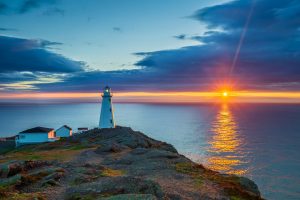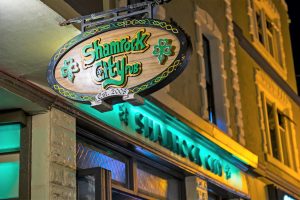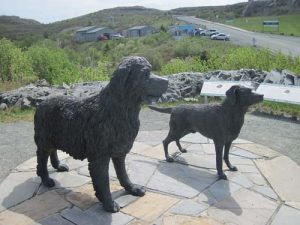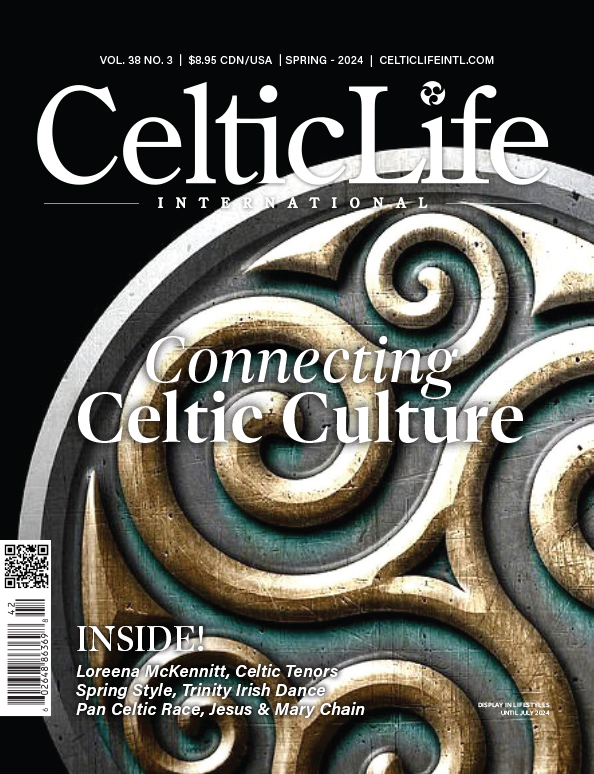
It rained overnight but was clearing by morning, so we drove to the end of the road at Cuckold’s Cove just outside of St. John’s and headed towards Signal Hill on a trail called Burma Road. It was constructed by the American military which built barracks here during World War II for men stationed in the city. Cuckold’s Cove itself was magnificent and I stood there looking south, wondering about a hurricane that was slowly careening north towards Nova Scotia and Newfoundland, generating powerfully destructive winds and awesome North Atlantic waves.
We braved a washed-out smaller trail up the headland past the cove that took us to Ladies’ Lookout on Signal Hill and – for a second time (but not in a storm) -circumnavigated the area and followed Burma Road back to the car. I dutifully got over the grudge I had been cultivating concerning the national historic site as we made our way home that morning for a brunch at the Celtic Hearth downtown and later a trip to the farmer’s market on Freshwater Road. There I was pleased to discover a wealth of locally grown vegetables and a wide range of ethnic foods that included Polish, Indian, Thai, Pakistani, and Iranian, just to name a few.
We returned yet again to our beloved Cape Spear so Linda could run yet another 10 km, this time in a gusty wind. I wandered around the parking lot for a bit where I must have seen a bumper sticker that preached, “Not all who wander are lost.” This very much reassured me of my status in this world on a morning like this, a Sunday when, once upon a time, I would be putting on a white shirt, a bad tie and a hand-me-down suit to wear to Sunday School and listen to stories from the Bible that often mystified and baffled me. (“If Jesus turned the water to wine,” I would query Mrs. Lorenz, “why is it that we are not supposed to drink alcohol?”) I repeated the wandering mantra as I headed onto the now-familiar trail to log a few kilometres myself and pick up a good wind burn from the salty zephyr. I later learned the bumper quote was not original but from Tolkien’s Lord of the Rings which did not diminish its value in any way.
I was passed by a few off-road bikers on the trail which surprised me since it was fairly tricky on foot, let alone on two wheels. I wondered if they were breaking any trail rules, but they seemed to be fairly polite when it came time to pass. I kept on meandering down the coast towards Maddox Cove, now consciously cultivating the gentle art of wandering on this morning instead of actually trying to get anywhere. This resulted in me feeling pleasantly gobsmacked by the big sweep of barrens off to my right and a low-lying marsh the size of Philadelphia that I would have called muskeg if I had known exactly what a muskeg was. Then I studied the slightly yellowing tamarack trees, the spruce and the fir and finally looked down to see if I could spot any cranberries or those bakeapples that Newfoundlanders so prize. I eventually found myself verbally complimenting the dark green ground cover, some hardy creeping vine with black berries that some fishing village boy in Nova Scotia once told me was called pigeon berry.

I took out my Art of War Book when I sat down on a slab of granite for a sip of water and read.
“When I let go of what I am, I become what I might be.” And even more appropriately, “Nature does not hurry, yet everything is accomplished.”
After that I continued to wander lonely as a cloud – well, not really lonely but alone. I wondered what those early Irish settlers made of this starkly beautiful place. Clearly, none of them wanted to live out here and get blasted regularly by the elements, but they may have come out here for the bakeapples and to shoot a moose to sustain them through the harsh winter. And, clearly, they didn’t give a tinker’s damn that this was the easternmost point in North America, nor why should they? In fact, why do we? I guess because we like things that are furthest this way or that, highest or deepest, smallest, or largest, because that’s the kind of species we are – believing most falsely that we are the smartest.
It is at a moment like this that I often cup my hand and run it through some unidentified leaves on those hardy shrubs and smell what they have to offer up. In this case, it was the scent of pure green chlorophyll filling my nostrils followed by the smell of bayberry and even a whiff of cinnamon thrown in as a chaser. Certainly, Tolkien himself or at least Frodo would understand well why I was doing that. I believe I turned around to head back to the car at that point, knowing Linda would reverse her route sooner or later.
Despite the fact I was enjoying my morning ramble, I had discovered that whichever way I was walking on the twisty path, the wind was in my face. I know that sounds like a lie akin to the one your grandfather told you: “In those days we had to walk five miles to school and from school each day, even during blizzards, and it was uphill in both directions.” However, in this case, the wind in your face from every quarter was due to the fact I was hiking on a point of land jutting out into the sea, so the wind was backing and veering and quite able to find you and slap your cheek in whichever way you were headed.
I eyed the lighthouse above the car park and determined it had now placed itself much further away than I wished, so I plodded onward, having lost my pure joy of wandering for the nonce. This prompted me to seek a short cut at the base of the hill, well below the main trail that went past the lighthouse on higher ground. This lower trail took me into what John Bunyan in The Pilgrim’s Progress would have called the Swamp of Despair, although hereabouts it was probably considered a bog. Which, of course, made the verb bog most appropriate as I soon became bogged down. With soaked footwear and socks plus jeans that seemed to soak up the water and then somehow siphon it up to my knees, I plodded on, now blaming the lighthouse for my discomfort since it seemed to be observing me with a combination of malice and mirth.
While slogging through my ill-chosen shortcut, I watched an artist (or at least I assumed he was an artist) setting up a rather large easel and canvas in the lee of a boulder the size of our Chevy Equinox. It seemed like a gloomy day to be painting the landscape, but then I remembered all those Group of Seven paintings I had seen at the Rooms back in St. John’s.
I had been told by an art historian that those muted, gloomy paintings were quintessentially Canadian – suggesting that we were ourselves organically formed somehow by the oft gloomy and muted lands we inhabited.
It was about then that my feet coaxed me up onto dry gravel, some kind of service road through the bog leading up to the lighthouse. I decided to forget about another damp shortcut and take it down to the main road pavement seeming much more desirable suddenly than raw headland. Not far along, I came across a manhole cover just like the ones you see in the city. Had I not been paying attention I would have thought nothing of it but a wordsmith like me is veritably addicted to reading any words he comes across whether they are on a traffic sign, in a store window or on a cereal box. And this manhole cover, in boldface raised iron letters read “Confined Space Dancer.”

My first reaction was that this would make a great title for a post-modern short story I should write once I got back to our apartment and dried my feet. But then it occurred to me that this made very little sense at all. Was there some avant-garde sort of performance space down there? And if so, what did the dance look like and how did an audience get to see it? No, it seemed completely out of the question and more than just a little out of the ordinary. Newfoundland just continued to be full of surprises.
When Linda finally joined me in the car, I was listening to some most excellent Celtic music by the Chieftains, Planxty, and the Boys of the Lough on a Sunday morning radio station out of St. John’s as I aired my wet socks out the window. I mentioned the words on the iron manhole cover, and she insisted I was mistaken or had ingested some wild plant on my hike that had made me hallucinate. It wasn’t until we were back on Water Street that afternoon, promenading with the multitude, that I pointed down to the words on a similar manhole cover in the middle of the street. “See. There it is,” I said. And so it was.
Linda gave me one those looks. You know the one I mean. “Confined Space Danger,” she read out loud. Now it made more sense – well almost. Okay, so the words I had read beneath the lighthouse had been damaged – altered somehow by the elements so that the “g” had been metabolized into what looked like a “c.” That explanation was reasonable. I had not been hallucinating. But still, why would anyone need to warn us pedestrians away from going down into a manhole that we would obviously know was a confined space? My assumption was that lawyers were involved somehow and that there were insurance reasons, but I remained determined to write that short story in hopes it might win some sort of literary prize.
One thing led to the next and before we could finish a discussion about literary manhole covers, we were back at Broderick’s where some patrons were still discussing the summer’s absence of Guinness. Evans and Doherty provided a fine obligatory version of “Dirty Old Town,” which I was beginning to believe was the official anthem of the city since I had heard it so often.
Today was our last day in Newfoundland and I felt like we had jam packed our trip with small adventures worthy of any twenty-first century explorers. The supposedly irascible James Cook had nothing on us except the fact that he had been here ahead of us and got to name many locales with quirky names that would last down through the centuries. Typical of us, we had not explored much of anything within three blocks of where we were staying in our second-floor apartment overlooking Duckworth Street and the harbour.
Linda went for a run in the city and I, feeling like I was missing out by staying indoors grading university essays, went out to see what was left to see. Well, there was a war memorial right across the street and a small ceremony was taking place with uniformed men and women placing plastic wreaths commemorating those who had died in the Battle of Britain. The Sun Tzu phrase, “Never interrupt your enemy when he is making a mistake,” came to my mind as I studied the monument, thinking that Hitler had been so thoroughly wrong to believe that attacking civilian London and other English cities would somehow break the spirit of the feisty English.
I walked down to the waterside where there were more monuments and statues. Faded historical plaques told me that I was at King’s Beach, once called Queen’s Beach, even though there was no real beach that I could see or even envision on this rocky shore. But here was where (perhaps) John Cabot had come ashore. And so had those long-gone Portuguese fishermen, old Sir Humphrey Gilbert and more “Planters” as well. Nearby was once the Admiralty Courts where military leaders decreed and enforced the laws of the land, often unfairly, in much earlier days.

What I most admired here were twin bronze statues of a Newfoundland and a Labrador dog. The large Newfie’s tongue was even hanging out in a most life-like way, reminding me of that large barking Bay Bulls dog that had drooled so profusely that he fully soaked my fingers with fresh warm dog saliva. How grand of the city and province to celebrate a couple of mutts. Posted nearby was a bit of history about the dogs and another reminder that Lord Byron had owned a Newfoundland dog that he cherished. When his beloved pet passed on, he wrote in his “Epitaph to a Dog,”
Near this Spot
are deposited the Remains of one
who possessed Beauty without Vanity,
Strength without Insolence,
Courage without Ferocity…
We had a decent brunch that day at Shamrock City serenaded by a folk singer named Arthur O’Brien. He had a gravelly voice that reminded me of a combination of Tom Waits and Stan Rogers, providing our daily dose of “Dirty Old Town” and other familiar tunes.
Fortunately for us, the hurricane was now still at least a day off so our flight home was smooth sailing and we were handily back in our nest near the shores of Lawrencetown Beach in time to haul in the lawn chairs and nail down a few loose shingles. I put away my backpack and copy of Sun Tzu until future travels and jotted down in my notebook the three things the old master had said should be my greatest treasures: “Simplicity, patience and compassion.” Here were guiding words to help Linda and me get through the remainder of the pandemic that was still sweeping much of North America but had, for the most part up until now, spared us in Atlantic Canada. ~ Story by Lesley Choyce






















Have enjoyed everything he written for Celtic Life.